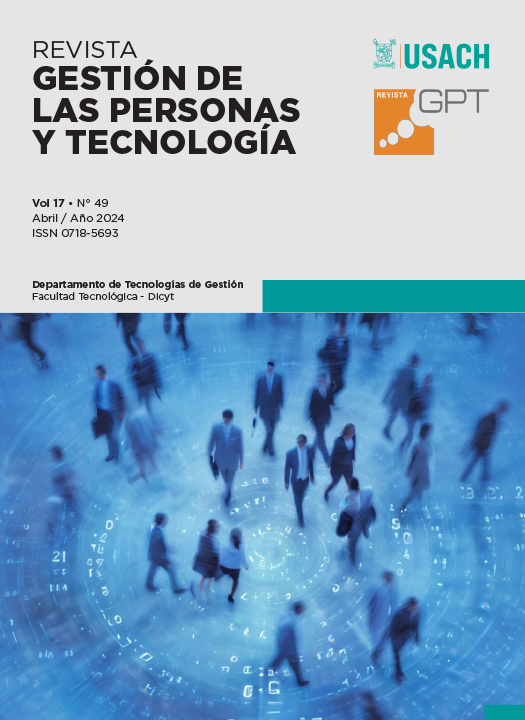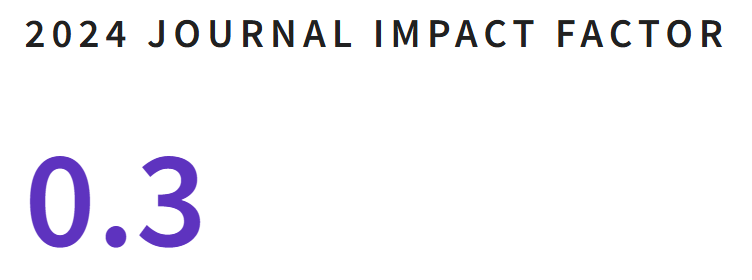Estudio bibliométrico sobre la felicidad laboral
DOI:
https://doi.org/10.35588/yh4dkd02Palabras clave:
Felicidad, felicidad en el trabajo, felicidad laboralResumen
El artículo tiene como objetivo analizar la producción científica en relación con la felicidad en el trabajo, mostrando el impacto que tiene este tema en la producción científica en la base de datos Web of Science. La metodología utilizada para desarrollar la investigación es bibliométrica, el estudio abarcó desde el año 2007 hasta la actualidad. Se utilizaron los software Bibliometrix y VOSviewer, para el procesamiento de los datos, se revisaron finalmente en profundidad 160 documentos considerando solo artículos de acceso abierto. El análisis de estos documentos incluyó autores, fuentes, palabras claves, citas, índice H y co-citaciónes, entre otros aspectos. A lo largo del tiempo, el tema de la felicidad ha sido relevante y se ha analizado desde diferentes áreas y perspectivas, sin embargo, en cuanto a la felicidad laboral, su estudio se ha ido incrementando lentamente, a pesar de la relevancia que, según la mayoría de los autores analizados, tiene este tema en las organizaciones del mundo moderno.
Descargas
Referencias
Allan, B. A., Batz-Barbarich, C., Sterling, H. M. y Tay, L. (2019). Outcomes of meaningful work: A meta‐analysis. The Journal of Management Studies, 56(3), 500–528. https://doi.org/10.1111/joms.12406
Alshurideh, M. T., Al Kurdi, B., Alzoubi, H. M., Akour, I., Obeidat, Z. M. y Hamadneh, S. (2023). Factors affecting employee social relations and happiness: SM-PLUS approach. Journal of Open Innovation Technology Market and Complexity, 9(2), 100033. https://doi.org/10.1016/j.joitmc.2023.100033
Ardanuy, J. (2012). Breve introducción a la Bibliometría. Barcelona: Universitat de Barcelona.
Aria, M. y Cuccurullo, C. (2017). bibliometrix: An R-tool for comprehensive science mapping analysis. Journal of Informetrics, 11(4), 959–975. https://doi.org/10.1016/j.joi.2017.08.007
Bailey, K. y Breslin, D. (2021). The COVID‐19 Pandemic: What can we learn from past research in organizations and management? International Journal of Management Reviews, 23(1), 3–6. https://doi.org/10.1111/ijmr.12237
Baily, M. N., Farrell, D., Greenberg, E., Henrich, J. D., Jinjo, N., Jolles, M. y Remes, J. (2005). Increasing global competition and labor productivity: Lessons from the US automotive industry. McKensie Global Institute.
Bakker, A. B., Hetland, J., Olsen, O. K. y Espevik, R. (2019). Daily strengths use and employee wellbeing: the moderating role of personality. Journal of Occupational and Organizational Psychology, 92(1), 144–168. https://doi.org/10.1111/joop.12243
Basinska, B. A. y Rozkwitalska, M. (2022). Psychological capital and happiness at work: The mediating role of employee thriving in multinational corporations. Current Psychology, 41(2), 549–562. https://doi.org/10.1007/s12144-019-00598-y
Bendassolli, P. (2018). Felicidade e trabalho. GV-EXECUTIVO, 6(4). https://doi.org/10.12660/gvexec.v6n4.2007.34637
Bhatnagar, V. R., Jain, A. K., Tripathi, S. S. y Giga, S. I. (2020). Beyond the competency frameworks-conceptualizing and deploying employee strengths at work. Journal of Asia Business Studies, 14(5). https://doi.org/10.1108/jabs-07-2019-0228
Bhatti, S. H., Vorobyev, D., Zakariya, R. y Christofi, M. (2021). Social capital, knowledge sharing, work meaningfulness, and creativity: Evidence from the pakistani pharmaceutical industry. Journal of Intellectual Capital, 22(2), 243–259. https://doi.org/10.1108/JIC-02-2020-0065
Boehm, J. K. y Lyubomirsky, S. (2008). Does happiness promote career success? Journal of Career Assessment, 16(1), 101–116. https://doi.org/10.1177/1069072707308140
Bok, D. (2010). The politics of happiness. Princeton University Press.
Boswell, W. R., Boudreau, J. W. y Tichy, J. (2005). The relationship between employee job change and job satisfaction: The honeymoon-hangover effect. The Journal of Applied Psychology, 90(5), 882–892. https://doi.org/10.1037/0021-9010.90.5.882
Buckingham, M. y Clifton, D. O. (2001). Ahora, descubre tus puntos fuertes. Simon and Schuster.
Cadmus, F. (2012). Happiness at work: Rules for employee satisfaction and engagement. Library Management and Technology, 22, 21–27. https://scholarship.law.cornell.edu/facpub/654
Campmany, J. (n.d.). Maslow o la psicología de la felicidad. Cataluña: Xarxa Telemática Educativa de Catalunya.
Cohen, S. B. (2002). Happiness and the immune system. Positive Health, 82.
Dahiya, R. y Rangnekar, S. (2018). Employee happiness a valuable tool to drive organisations. En M. Yadav, S. Kumar Trivedi, A. Kumar y S. Rangnekar (Eds.), Harnessing Human Capital Analytics for Competitive Advantage (pp. 24–54). IGI Global. https://doi.org/10.4018/978-1-5225-4038-0.ch002
De Neve, J. y Ward, G. W. (2017). La felicidad en el trabajo. SSRN. http://dx.doi.org/10.2139/ssrn.2943318
Di Tella, R., Macculloch, R. y Oswald, A. (2001). The macroeconomics of happiness. Coventry: The University of Warwick.
Díaz-Pincheira, F. J. y Carrasco-Garces, M. E. (2018). Efectos del clima organizacional y los riesgos psicosociales sobre la felicidad en el trabajo. Contaduría y Administración, 63(4), 52. https://doi.org/10.22201/fca.24488410e.2018.1142
Diener, E. (2000). Subjective well-being: The science of happiness and a proposal for a national index. American Psychologist, 55(1). https://doi.org/10.1037/0003-066X.55.1.34
Di María, C. H., Peroni, C. y Sarracino, F. (2020). Happiness matters: productivity gains from subjective well-being. Journal of Happiness Studies, 21(1), 139–160. https://doi.org/10.1007/s10902-019-00074-1
Extremera, N. y Fernández-Berrocal, P. (2014). The subjective happiness scale: Translation and preliminary psychometric evaluation of a Spanish version. Social Indicators Research, 119(1), 473–481. https://doi.org/10.1007/s11205-013-0497-2
Fisher, C. D. (2010). Happiness at work: Happiness at work. International Journal of Management Reviews, 12(4), 384–412. https://doi.org/10.1111/j.1468-2370.2009.00270.x
Garzon-Castrillon, M. A., Orozco-Quintero, D. y Ramírez-Gañan, A. E. (2020). Gestión de la felicidad, bienestar subjetivo y satisfacción laboral. Dimensión Empresarial, 18(2). https://doi.org/10.15665/dem.v18i2.2057
Galván, E., Mercader, V., Arango, E. y Ruiz, M. (2021). Empowerment and support of senior management in promoting happiness at work. CETYS Universidad (México).
Giardini, A. y Frese, M. (2008). Linking service employees’ emotional competence to customer satisfaction: a multilevel approach. Journal of Organizational Behavior, 29(2), 155–170. https://doi.org/10.1002/job.509
Grant, A., Christianson, M. K. y Price, R. H. (2007). Happiness, health, or relationships? Managerial practices and employee well-being tradeoffs. The Academy of Management Perspectives, 21(3), 51–63. https://doi.org/10.5465/amp.2007.26421238
Grawitch, M. J., Gottschalk, M. y Munz, D. C. (2006). The path to a healthy workplace: A critical review linking healthy workplace practices, employee well-being, and organizational improvements. Consulting Psychology Journal, 58(3), 129–147. https://doi.org/10.1037/1065-9293.58.3.129
Griffin, R. W. (1991). Research notes. Effects of work redesign on employee perceptions, attitudes, and behaviors: A long-term investigation. Academy of Management Journal, 34(2), 425–435. https://doi.org/10.2307/256449
Harter, James K., Schmidt, F. L. y Keyes, C. L. M. (2003). Well-being in the workplace and its relationship to business outcomes: A review of the Gallup studies. En C. L. M. Keyes y J. Haidt (Eds.), Flourishing: Positive psychology and the life well-lived (pp. 205–224). American Psychological Association. https://doi.org/10.1037/10594-009
Hernández, R., Fernández, C. y Baptista, P. (2010). Metodología de la investigación (Quinta ed.). McGraw-Hill.
Hewett, R., Liefooghe, A., Visockaite, G. y Roongrerngsuke, S. (2018). Bullying at work: cognitive appraisal of negative acts, coping, well-being, and performance. Journal of Occupational Health Psychology, 23(1). https://doi.org/10.1037/ocp0000064
Hill, C. W. L. y Schilling, M. A. (2016). MindTap for Hill/Schilling’s Strategic Management: Theory & cases: An Integrated Approach. Cengage Learning. https://www.cengage.com/c/strategic-management-theory-cases-an-integrated-approach-14e-hill/9780357716625/
Huppert, F. A. (2009). Psychological Well‐being: Evidence Regarding its Causes and Consequences. Applied Psychology. Health and Well-Being, 1(2), 137–164. https://doi.org/10.1111/j.1758-0854.2009.01008.x
Ilies, R., Fulmer, I. S., Spitzmuller, M. y Johnson, M. D. (2009). Personality and citizenship behavior: The mediating role of job satisfaction. The Journal of Applied Psychology, 94(4), 945–959. https://doi.org/10.1037/a0013329
Ilies, R., Wilson, K. S. y Wagner, D. T. (2009). The spillover of daily job satisfaction onto employees’ family lives: The facilitating role of work-family integration. Academy of Management Journal, 52(1), 87–102. https://doi.org/10.5465/amj.2009.36461938
Kadoya, Y., Khan, M. S. R., Watanapongvanich, S. y Binnagan, P. (2020). Emotional status and productivity: Evidence from the special economic zone in Laos. Sustainability, 12(4), 1544. https://doi.org/10.3390/su12041544
Bayhan-Karapinar, P., Metin-Camgoz, S. y Tayfur-Ekmekci, O. T. (2019). Employee well-being, workaholism, work- family conflict and instrumental spousal support: a moderated mediation model. Journal of Happiness Studies, 1, 1–21. https://doi.org/10.1007/s10902-019-00191-x
Kern, L. M., Adler, A., Waters, E. L. y White, A. M. (2015). Measuring whole-school well-being in students and staff, in Evidence-Based Approaches in Positive Education: Implementing a Strategic Framework for Well-being in Schools (A. M. White & S. A. Murray, Eds.). Springer.
Keyes, C. L. M. (2002). The mental health continuum: From languishing to flourishing in life. Journal of Health and Social Behavior, 43(2), 207. https://doi.org/10.2307/3090197
Keyes, C. L. M. (2005). Mental illness and/or mental health? Investigating axioms of the complete state model of health. Journal of Consulting and Clinical Psychology, 73(3), 539–548. https://doi.org/10.1037/0022-006x.73.3.539
Layard, R. (2006). Happiness: Lessons from a new science. Penguin Press.
Le Pine, J. A., Erez, A. y Johnson, D. E. (2002). The nature and dimensionality of organizational citizenship behavior: A critical review and meta-analysis. The Journal of Applied Psychology87(1), 52–65. https://doi.org/10.1037/0021-9010.87.1.52
Lyubomirsky, S., King, L. y Diener, E. (2005). The benefits of frequent positive affect: Does happiness lead to success? Psychological Bulletin, 131(6), 803–855. https://doi.org/10.1037/0033-2909.131.6.803
Martin, G., Beaumont, P., Doig, R. y Pate, J. (2005). Branding: A New Performance Discourse for HR?. European Management Journal, 23(1), 76–88. https://doi.org/10.1016/j.emj.2004.12.011
Martínez-Martí, M. L. y Ruch, W. (2017). The relationship between orientations to happiness and job satisfaction one year later in a representative sample of employees in Switzerland. Journal of Happiness Studies, 18(1), 1–15. https://doi.org/10.1007/s10902-016-9714-4
Ménard, J. y Brunet, L. (2011). Authenticity and well-being in the workplace: a mediation model. Journal of Managerial Psychology, 26, 331–346. https://doi.org/10.1108/02683941111124854
Moccia, S. (2016). Happiness at work. Papeles del Psicólogo, 37(2). https://www.papelesdelpsicologo.es/English/2699.pdf
Morán, M. C., Fínez, M. J. y Fernández-Abascal, E. G. (2017). Sobre la felicidad y su relación con tipos y rasgos de personalidad. Clinica y salud, 28(2), 59–63. https://doi.org/10.1016/j.clysa.2016.11.003
Mousa, M., Massoud, H. y Ayoubi, R. (2020). Gender, diversity management perceptions, workplace happiness and organisational citizenship behaviour. Employee Relations, 42(6). https://doi.org/10.1108/ER-10-2019-0385
Nduhura, D. y Prieler, M. (2017). When I chat online, I feel relaxed and work better: Exploring the use of social media in the public sector workplace in Rwanda. Telecommunications Policy, 41(7), 708–716. https://doi.org/10.1016/j.telpol.2017.05.008
Oswald, A. J., Proto, E. y Sgroi, D. (2015). Happiness and productivity. Journal of Labor Economics, 33(4), 789–822. https://doi.org/10.1086/681096
Page, K. M. y Vella-Brodrick, D. A. (2009). The ‘what’, ‘why’ and ‘how’ of employee well-being: A new model. Social Indicators Research, 90(3), 441–458. https://doi.org/10.1007/s11205-008-9270-3
Peterson, C. S. y Seligman, M. E. P. (2004). Fortalezas y virtudes del carácter: manual y clasificación. Asociación Americana de Psicología.
Prasoon, R. y Chaturvedi, K. R. (2016). Life Satisfaction: A literature Review. The Researcher- International Journal of Management Humanities and Social Sciences, 1(2), 25–32.
Pricewaterhouse Coopers (2014). Workplace Wellness in Australia. http://www.usc.edu.au/media/3121/WorkplaceWellnessinAustralia.pdf
Pulido-Acosta, F. y Herrera-Clavero, F. (2018). Predictores de la Felicidad y la Inteligencia Emocional en la Educación Secundaria. Revista Colombiana de Psicología, 27(1), 71–84. https://doi.org/10.15446/rcp.v27n1.62705
Raibley, J. R. (2012). Happiness is not Well-Being. Journal of Happiness Studies, 13(6), 1105–1129. https://doi.org/10.1007/s10902-011-9309-z
Rego, A. y Pina e Cunha, M. (2008). Authentizotic climates and employee happiness: pathways to individual performance? Journal of Business Research, 61(7), 739–752. https://doi.org/10.1016/j.jbusres.2007.08.003
Robertson, I. T. y Cooper, C. L. (2010). Full engagement: the integration of employee engagement and psychological well-being. Leadership & Organization Development Journal, 31(4), 324–336. https://doi.org/10.1108/01437731011043348
Salas-Vallina, A. (2017). La felicidad en el trabajo: un reto alcanzable para las empresas. Capital Humano, 325, 74–77. https://www.psicovitalem.com/wp-content/uploads/2020/08/LA-FELICIDAD-EN-EL-TRABAJO.pdf
Salas-Vallina, A., Alegre, J. y Fernández, R. (2017). Happiness at work and organisational citizenship behaviour: is organisational learning a missing link? International Journal of Manpower, 38(3), 470–488. https://doi.org/10.1108/IJM-10-2015-0163
Salas-Vallina, A., López-Cabrales, Á., Alegre, J. y Fernández, R. (2017). On the road to happiness at work (HAW) Transformational leadership and organizational learning capability as drivers of HAW in a healthcare context. Personnel Review, 46(2), 314–338. https://doi.org/10.1108/PR-06-2015-0186
Sánchez, J. y Alvear, S. (2022). Implementación de sistemas de evaluación de personal en empresas chilenas, etapa inicial para medir su impacto en la gestión de la empresa. Revista Contaduría y Administración, 66(1), 1-24. http://dx.doi.org/10.22201/fca.24488410e.2021.1966
Sánchez-Álvarez, N., Extremera, N. y Fernández-Berrocal, P. (2016). The relation between emotional intelligence and subjective well-being: A meta-analytic investigation. The Journal of Positive Psychology, 11(3), 276–285. https://doi.org/10.1080/17439760.2015.1058968
Satuf, C., Monteiro, S., Pereira, H., Esgalhado, G., Afonso, R. y Loureiro, M. (2018). The protective effect of job satisfaction in health, happiness, well-being and self-esteem. International Journal of Occupational Safety and Ergonomics, 24(2), 181–189. https://doi.org/10.1080/10803548.2016.1216365
Sears, L. E., Shi, Y., Coberley, C. R. y Pope, J. E. (2013). Overall well-being as a predictor of health care, productivity, and retention outcomes in a large employer. Population Health Management, 16(6), 397–405. https://doi.org/10.1089/pop.2012.0114
Seguí-Díaz, M. (2017). ¿Influye la felicidad en la mortalidad. Semergen, 43(3), 232–233. https://doi.org/10.1016/j.semerg.2016.04.007
Seligman, M. E. (2002). Authentic happiness: Using the new Positive Psychology to realize your potential for lasting fulfilment. Nicholas Brealey Publishing.
Sels, L., De Winne, S., Delmotte, J., Maes, J., Faems, D. y Forrier, A. (2006). Linking HRM and small business performance: An examination of the impact of HRM intensity on the productivity and financial performance of small businesses. Small Business Economics, 26(1), 83–101. https://doi.org/10.1007/s11187-004-6488-6
Sharma, P., Kong, T. T. C. y Kingshott, R. P. J. (2016). Internal service quality as a driver of employee satisfaction, commitment and performance: exploring the focal role of employee well-being. Journal of Service Management, 27(5), 773–797. https://doi.org/10.1108/JOSM-10-2015-0294
Singh, S. y Aggarwal, Y. (2018). Happiness at Work Scale: Construction and Psychometric Validation of a Measure Using Mixed Method Approach. Journal of Happiness Studies, 19, 1439–1463. https://doi.org/10.1007/s10902-017-9882-x
Sirgy, M. J., Efraty, D., Siegel, P. y Lee, D. J. (2001). A New Measure of Quality of Work Life (QWL) Based on Need Satisfaction and Spillover Theories. Social Indicators Research, 55(3), 241–302. https://doi.org/10.1023/a:1010986923468
Srivastava, S., Mendiratta, A., Pankaj, P., Misra, R. y Mendiratta, R. (2022). Happiness at work through spiritual leadership: A self-determination perspective. Employee Relations, 44(4), 972–992. https://doi.org/10.1108/ER-08-2021-0342
Staw, B. M. (1980). Las consecuencias del volumen de negocios. Revista de Comportamiento Ocupacional, 1(4), 253–273.
Thompson, A. y Bruk-Lee, V. (2020). Employee happiness: why We should care. Applied Research in Quality of Life, 16(4). https://doi.org/10.1007/s11482-019-09807-z
Tisu, L., Lups, a, D., Vîrgă, D. y Rusu, A. (2020). Personality characteristics, job performance and mental health the mediating role of work engagement. Personality and Individual Differences, 153. https://doi.org/10.1016/j.paid.2019.109644
Turban, D. B. y Yan, W. (2016). Relationship of eudaimonia and hedonia with work outcomes. Journal of Managerial Psychology, 31(6), 1006–1020. https://doi.org/10.1108/JMP-07-2015-0271
Ulrich, D. y Smallwood, N. (2004). Capitalizing on capabilities. Harvard Business Review, 82(6), 119–127. https://hbr.org/2004/06/capitalizing-on-capabilities
Veenhoven, R. (1997). Advances in Understanding Happiness. Revue Québécoise de Psychologie, 18, 29–74.
Vera-Noriega, J. Á., Velasco-Arellanes, F. J., Grubits-Goncalves de Oliveira, H. B. y Salazar-Millán, I. G. (2016). Parámetros de inclusión y exclusión en los extremos de la felicidad y satisfacción con la vida en México. Acta de Investigación Psicológica, 6(2), 2395–2403. https://doi.org/10.1016/j.aipprr.2016.06.002
Wang, J. L., Zhang, D. J. y Jackson, L. A. (2013). Influence of self‐esteem, locus of control, and organizational climate on psychological empowerment in a sample of Chinese teachers. Journal of Applied Social Psychology, 43(7), 1428–1435. https://doi.org/10.1111/jasp.12099
Warr, P. (2007). Trabajo, felicidad e infelicidad. Lawrence Erlbaum Associates.
Warr, P. (2013). Fuentes de felicidad e infelicidad en el trabajo: una perspectiva combinada. Revista de psicología del trabajo y de las organizaciones, 29(3), 99–106. https://doi.org/10.5093/tr2013a15
Waters, L. y Stokes, H. (2015). Positive education for school leaders: Exploring the effects of emotion-gratitude and action-gratitude. The Educational and Developmental Psychologist, 32(1), 1–22. https://doi.org/10.1017/edp.2015.1
Wesarat, P., Sharif, M. Y. y Majid, A. H. (2015). A Conceptual Framework of Happiness at the Workplace. Asian Social Science, 11(2), 78–88. https://doi.org/10.5539/ass.v11n2p78
Williams, P., Kern, M. L. y Waters, L. (2016a). Exploring selective exposure and confirmation bias as processes underlying employee work happiness: An intervention study. Frontiers in Psychology, 7. https://doi.org/10.3389/fpsyg.2016.00878
Williams, P., Kern, M. L. y Waters, L. (2016a). Exploring selective exposure and confirmation bias as processes underlying employee work happiness: An intervention study. Frontiers in Psychology, 7. https://doi.org/10.3389/fpsyg.2016.00878
Wilson, M. G., Dejoy, D. M., Vandenberg, R. J., Richardson, H. A. y Mcgrath, A. L. (2004). Work characteristics and employee health and well-being: Test of a model of healthy work organization. Journal of Occupational and Organizational Psychology, 77(4), 565–588. https://doi.org/10.1348/0963179042596522
Wok, S. y Hashim, J. (2015). The Moderating Effect of Employee Relations on Networking Towards Workplace Happiness among Married Women in Malaysia. Procedia - Social and Behavioral Sciences, 211, 306–312. https://doi.org/10.1016/j.sbspro.2015.11.039
Wright, P. M. y Nishii, L. H. (2013). Strategic HRM and organizational behavior: integrating multiple levels of analysis. En J. Paauwe, D. Guest y P. M. Wright (Eds.), HRM and Performance: Achievements and Challenges (pp. 97–110). John Wiley and Sons.
Wright, T. A. y Cropanzano, R. (2015). The happy/productive worker thesis revisited. Research in Personnel and Human Resources Management, 26, 269-307. https://doi.org/10.1016/S0742-7301(07)26006-2
Wright, T. A. y Bonett, D. G. (2007). Job satisfaction and psychological well-being as nonadditive predictors of workplace turnover. Journal of Management, 33(2), 141–160. https://doi.org/10.1177/0149206306297582
Wright, T. A., Cropanzano, R., Bonett, D. G. y Diamond, W. J. (2009). The role of employee psychological well-being in cardiovascular health: when the twain shall meet. Journal of Organizational Behavior, 30(2), 193–208. https://doi.org/10.1002/job.592
Wright, T. A. y Huang, C. C. (2012). The many benefits of employee well-being in organizational research. Journal of Organizational Behavior, 33(8), 1188–1192. https://doi.org/10.1002/job.1828
Wright, T. A., Cropanzano, R. y Bonett, D. G. (2007). The moderating role of employee positive well being on the relation between job satisfaction and job performance. Journal of Occupational Health Psychology, 12(2), 93–104. https://doi.org/10.1037/1076-8998.12.2.93
Wrzesniewski, A., McCauley, C., Rozin, P. y Schwartz, B. (1997). Jobs, careers, and callings: People’s relations to their work. Journal of Research in Personality, 31(1), 21–33. https://doi.org/10.1006/jrpe.1997.2162
Yerkes, L. (2008). Produtividade divertida: criando lugares onde as pessoas adoram trabalhar. Matrix Yin, R. K.
Youssef, C. M. y Luthans, F. (2007). Positive organizational behavior in the workplace: the impact of hope, optimism, and resilience. Journal of Management, 33(5), 774–800. https://doi.org/10.1177/0149206307305562
Descargas
Enviado
2023-04-26Publicado
Versiones
- 2024-05-13 (3)
- 2024-05-07 (2)
- 2024-04-23 (1)
Número
Sección
Licencia
Derechos de autor 2024 Revista Gestión de las Personas y Tecnología

Esta obra está bajo una licencia internacional Creative Commons Atribución-NoComercial-SinDerivadas 4.0.










